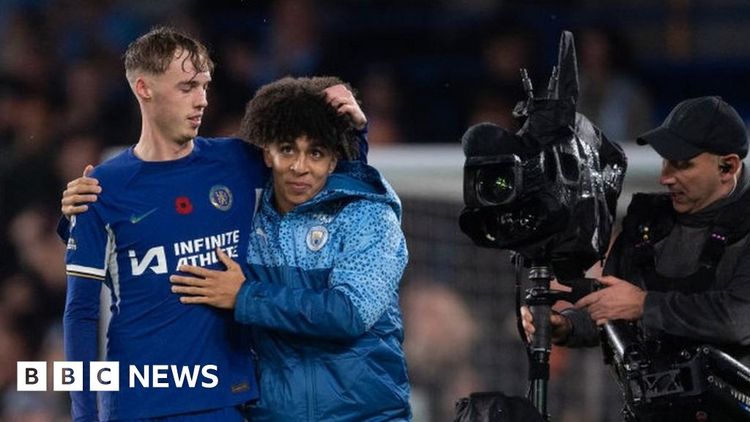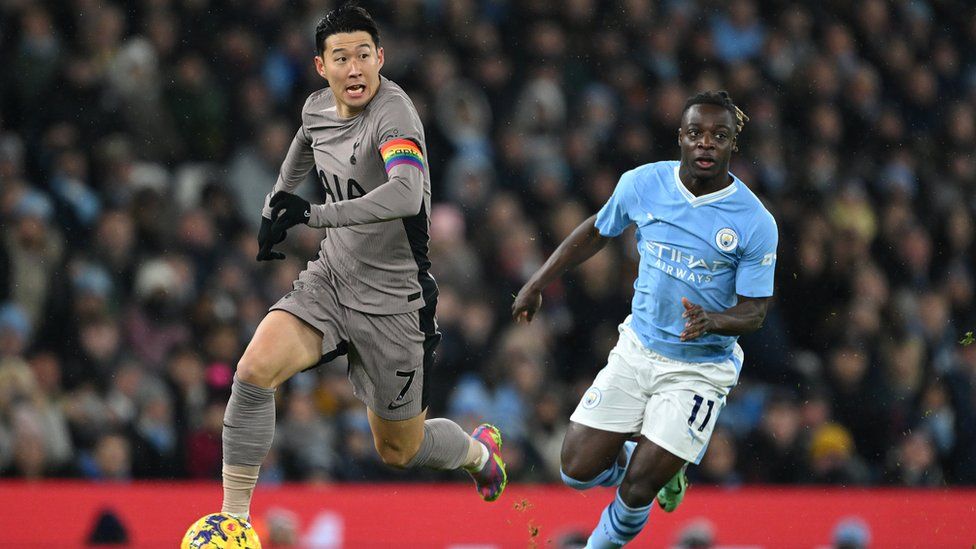Premier League: Is football's Saturday 3pm TV blackout out of date?

The blogging segment can be rephrased into simpler English as follows: The picture is taken from Getty Images.

The recent television agreement involves the BBC's continuation of presenting Premier League highlights during the program called Match of the Day.
From 2025, there will be an increase in the number of football matches broadcasted on TV because of the Premier League's recent £6.7bn television agreement, which has set a new record.
Although Sky and TNT are set to air approximately 270 live games per season, certain aspects have remained unchanged.
The rule that bans broadcasting games on Saturdays at 3pm called "blackout" will remain in place, and no matches will be available on TV from 2:25 PM to 5:25 PM during that day. This regulation will stay unchanged until the latest agreement expires in 2029.
Is it necessary to maintain the rule that was established in 1960 to motivate supporters to attend lower league football matches in modern times?
Adam Capper, who works as a kitman for Heaton Stannington outside of the professional league, believes that the answer to this question is definitely affirmative.
The football team he supports plays in a very low league, the ninth tier, of English football. Surprisingly, their location is just a short distance of three miles away from the famous Premier League club, Newcastle United's stadium, St James' Park.
According to Adam, if the blackout gets lifted, viewers would be able to witness essentially every Premier League match. This signifies that they won't have any interest in watching their hometown non-league team.
According to him, non-league clubs across all tiers depend on ticket sales as their primary source of revenue. The number of people in attendance determines their financial stability.
We could potentially experience a major decrease in the number of individuals attending games, and numerous football clubs may encounter financial difficulties and potentially go out of business.
According to Adam Capper, the power outage is essential "if you desire for English football to possess the sturdiest hierarchical structure internationally."
According to Adam, who is a supporter of the Newcastle team, Heaton Stannington has an approximate of 400 fans attending their home games on average.
"If the match is at Newcastle's stadium, we can expect around 200 people," the individual, who is 33 years old, comments.
If there is a game that doesn't happen at the same time as Newcastle United, we could potentially attract 700 supporters.
Most people have a top-tier football team or a lower-tier football team they support first, and a non-professional team they'll watch as a second choice.
Suppose people have to make a decision between watching a live stream from their home or attending a game at our level unexpectedly, they will most likely prefer the live stream.
According to 35-year-old Latoyah Egerton, a supporter of Exeter City, going to matches is an essential component of the football club's revenue in the League One, which is the third-level tier.
She mentioned that during the colder months, when there's an important Premier League game at 3pm, many individuals might decide to stay in their homes to view the match on TV rather than going to the event.
Without a doubt, the presence of other major games at the same time can impact the turnout.
Our club doesn't rely on wealthy sponsors to support us. Instead, it is our fans who have a significant ownership stake in the organization. That is why it is crucial to encourage and incentivize people to come and participate in our events.
The picture above is credited to Roopa Vyas. --- The blog post below was not provided.
According to Roopa Vyas, the popularity of Liverpool FC often results in her being unable to attend their matches in person due to sold-out tickets.
However, there are Premier League enthusiasts who do not share the same opinion as Adam and Latoyah.
Roopa Vyas, a resident of Caerphilly in south Wales who supports Liverpool, believes that the blackout is obsolete and does not serve any meaningful purpose.
"I can see why it was introduced during the 1960s, but currently, the Premier League has become a global spectacle," says the 26-year-old.
As someone who supports Liverpool in the UK, it feels unjust that I am unable to watch my team play. Conversely, individuals in other countries possess the ability to watch every game in the Premier League, which appears to be discriminatory towards us.
In Roopa's opinion, the blackout policy only serves to entice individuals to seek out unlawful means of viewing the games, instead of attending live non-league matches.
She claims that although there is radio commentary available, it is not as fulfilling as actually watching the goals.
"I am acquainted with numerous individuals who engage in illegal streaming, and I understand their reasons, as they simply desire to watch their favorite team."
The picture is from Emma Bowell.
Emma Bowell desires to witness women's games broadcasted on television during Saturday afternoons.
Earlier this week, the authorities declared their support for all the proposals put forth by Karen Carney, a retired midfielder from England, who headed the women's football review. One of the recommendations was to provide a unique schedule for the matches.
Emma Bowell, a fan of Chelsea in the Women's Super League, considers the 3pm blackout an opportune time for watching football.
She opines that this is a great chance for us to target a new group of people and prominently feature women's football.
There may be many folks who are disinterested in catching a game featuring their hometown or minor league squad for various reasons, but they could potentially get behind rooting for their club's female team.
However, Emma, who is 32 years old, is aware that the power outage was initially implemented to safeguard men's games in lower league competitions.
She suggests that if we believe that 3pm is the best time to present women's sports to the public, we should go ahead and do it.
In my opinion, it is necessary to ensure that the revenue generated from broadcasting is distributed to women's football at all levels, including grassroots teams.
Tune in to Newsbeat's live broadcast at 12:45 and 17:45 on weekdays, or check out the recorded version here later.







































































